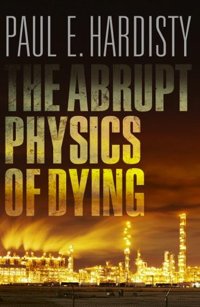
Anyone who has traveled through the Arab world or knows a little Arabic will know the phrase in’shallah – God willing. It’s a catch-all phrase covering anything from the weather to your chances of making it through the night alive. And it’s a phrase that permeates The Abrupt Physics of Dying, a new eco-thriller by university professor and hydrologist Paul E Hardisty. Yet this novel is not about Islam, nor is it about terrorism in the sense that it’s commonly understood.
The year is 1994, and Claymore Straker is a South African-born contractor working with the big oil company Petro-Tex to secure environment approval for oil drills in the desert. His method is to offer facilitation payments to local villagers – people too poor or desperate to realise they’re being conned. Just as Clay is beginning to question the ethics of his job, he’s hijacked at gunpoint.
Clay and his driver, a pious Muslim named Abdulkader who leaves everything in the hands of God, find two men with AK-47s in their car as they are traveling through the vast nothingness of Yemen. The gunmen guide them up the wadi, or valley in English, to a man who calls himself Al Shams – The Sun. Al Shams happens to be the terrorist who killed Clay’s colleague Thierry Champard. He wants Clay to find proof that Petro-Tex is poisoning villagers around their new processing facility. He wants it done without arousing any military interest, and then to get the word out to the world. In order to make him oblige, Al Shams takes Abdulkader hostage, and says he will kill the driver if Clay does not find proof by the new moon.
Clay’s search turns up an accountant who refuses to pay Clay’s cheques, a boss who hates him, and a Bulgarian security officer named Zdravko who just happens to be a trigger-happy psychopath. But he can’t find the evidence he needs. He’s about to give up when he spies a beautiful woman. Rania is half-French, half-Arabic, and happens to be a foreign journalist for the AFP. However she refuses to publish anything without proof. They part, but it certainly won’t be the last they see of each other.
In the meantime Clay is taking water tests and examining the villages Al Sham mentioned. Children are sick and dying, women are miscarrying, and the most likely culprit is the water they drink, bathe in and use for laundry. To trace impurities back to the new processing plant Clay needs to run a series of tests and samples, and is receiving no help from the authorities. With every step he finds himself making new enemies, to the point where it seems no one is on his side. He finds himself interrogated, imprisoned and beaten – all to stop him from uncovering the truth, which itself seems to evade him.
The number and severity of beatings that Clay receives is astonishing, to the point where it’s hard to suspend disbelief. Injuries and traumas that would kill any one of us in any environment, coupled with horrifying conditions, often make this book tough to swallow.
From the beginning to the end – both of which are played out at gunpoint – this novel is non-stop action. It’s thrilling, but also highly sophisticated, and offers a startling look at what developed countries will do in their hunger for resources. It’s tightly plotted, although falls apart slightly during two or three moments of realisation, when it suddenly becomes obvious to Clay that his friends are not actually who they say they are, without it really being made clear enough as you read. This, coupled with the number of foreign terms slipped into the text, something which peaks with an old South African soldier named Crowbar, can make for a confusing read. But The Abrupt Physics of Dying is certainly worth the moments of confusion. It gives a great insight into a part of the world that doesn’t often get a look-in in the world of crime fiction.
Orenda Books
Kindle
£0.85
CFL Rating: 4 Stars









